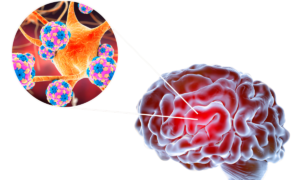
Definition of Meningitis
Meningitis is an inflammation of the meninges, the protective membranes that surround the brain and spinal cord. This inflammation is typically caused by an infection of the fluid (cerebrospinal fluid or CSF) surrounding these vital structures. While often caused by viruses or bacteria, meningitis can also result from fungal infections, parasites, certain drugs, or non-infectious conditions like cancer or autoimmune diseases. It can be a serious and life-threatening condition, especially bacterial meningitis, which requires urgent medical attention.
Types of Meningitis
Meningitis is categorized primarily by the cause of the inflammation:
· Bacterial Meningitis: This is the most severe and potentially life-threatening form. Common bacteria that cause meningitis include Streptococcus pneumoniae (pneumococcus), Neisseria meningitidis (meningococcus), and Haemophilus influenzae type b (Hib, less common due to vaccination). Bacterial meningitis can lead to serious complications like brain damage, hearing loss, learning disabilities, or even death if not treated promptly.
· Viral Meningitis: This is the most common and usually less severe form. It’s often caused by enteroviruses, but can also be caused by viruses like herpes simplex virus, mumps, measles, and influenza. Viral meningitis typically resolves on its own within 7-10 days, though some cases can be more severe.
· Fungal Meningitis: A rare type of meningitis, occurring when a fungus spreads from another part of the body to the brain or spinal cord. It typically affects people with weakened immune systems (e.g., HIV/AIDS, cancer, organ transplant recipients). Common fungi include Cryptococcus, Coccidioides, and Candida.
· Parasitic Meningitis: Extremely rare, caused by certain parasites. Examples include eosinophilic meningitis (caused by nematodes like Angiostrongylus cantonensis) and primary amoebic meningoingoencephalitis (caused by Naegleria fowleri), which is very rare but often fatal.
· Non-infectious Meningitis: This type is not caused by an infection. It can be a result of:
1. Autoimmune diseases: Such as lupus or rheumatoid arthritis.
2. Cancer: When cancer cells spread to the meninges.
3. Certain drugs: Including some nonsteroidal anti-inflammatory drugs (NSAIDs) or specific antibiotics.
4. Head injury or brain surgery: Which can sometimes trigger inflammation.
Symptoms of Meningitis
The symptoms of meningitis can appear suddenly and may resemble the flu, but they tend to be more severe. The classic triad of symptoms includes fever, headache, and neck stiffness. However, not everyone experiences all symptoms, and they can vary depending on age and the cause of the meningitis.
Common symptoms in adults and older children include:
· Sudden high fever: Often one of the first signs.
· Severe headache: Unlike a typical headache, often accompanied by neck stiffness.
· Stiff neck: Difficulty or inability to touch the chin to the chest.
· Nausea or vomiting: Common, especially with increased intracranial pressure.
· Confusion or altered mental status: Drowsiness, difficulty concentrating, or disorientation.
· Sensitivity to light (photophobia): Discomfort in bright light.
· Lack of appetite or thirst.
· Skin rash: Particularly with meningococcal meningitis (a purplish, bruise-like rash that doesn’t fade when pressed).
· Seizures.
Symptoms in newborns and infants can be less specific:
· High fever.
· Constant crying.
· Excessive sleepiness or irritability.
· Poor feeding.
· Bulging soft spot (fontanelle) on the baby’s head.
· Stiffness in the body and neck.
· Unusual arching of the back (opisthotonos).
Causes of Meningitis
Meningitis is primarily caused by microorganisms that spread to the meninges through the bloodstream, or sometimes through direct contact (e.g., after a head injury or surgery).
· Bacteria:
1. Streptococcus pneumoniae (pneumococcus): Leading cause of bacterial meningitis in adults and children.
2. Neisseria meningitidis (meningococcus): Often causes epidemics, particularly in crowded settings.
3. Haemophilus influenzae type b (Hib): Once a common cause, now largely prevented by vaccination.
4. Listeria monocytogenes: Can affect newborns, older adults, and people with weakened immune systems (often linked to contaminated food).
5. Group B Streptococcus: A common cause of meningitis in newborns.
6. Group B Streptococcus: A common cause of meningitis in newborns.
· Viruses:
1. Enteroviruses: The most common cause of viral meningitis (e.g., Coxsackievirus).
2. Herpes simplex virus.
3. Mumps virus.
4. Measles virus.
5. Influenza virus.
6. West Nile virus, HIV.
· Fungi:
a. Cryptococcus neoformans: Often affects individuals with weakened immune systems.
b. Coccidioides immitis: Found in soil in certain regions.
c. Candida species
· Parasites:
1. Angiostrongylus cantonensis (rat lungworm).
2. Naegleria fowleri (brain-eating amoeba, usually from contaminated freshwater).
· Non-infectious conditions:
1. Certain cancers (e.g., leukemia, lymphoma).
2. Autoimmune inflammatory diseases (e.g., lupus, Behçet’s disease).
3. Reactions to certain medications (e.g., NSAIDs, IV immunoglobulin).
4. Head trauma or neurosurgery.
Who Can Suffer from Meningitis?
Meningitis can affect anyone, regardless of age, but certain groups are at higher risk:
· Infants and Young Children: Particularly vulnerable, especially to bacterial meningitis, due to their developing immune systems.
· Adolescents and Young Adults: Especially those living in close quarters (e.g., college dorms, military barracks) due to the risk of meningococcal meningitis.
· Older Adults: More susceptible to certain types of bacterial meningitis, like Listeria.
· Individuals with Weakened Immune Systems: Those with HIV/AIDS, cancer, diabetes, or those on immunosuppressant drugs are at higher risk for fungal and some bacterial types.
· People Living in or Traveling to Endemic Areas: Regions where certain types of meningitis are more common (e.g., the “meningitis belt” in sub-Saharan Africa for meningococcal meningitis).
· Healthcare Workers and Lab Personnel: May have increased exposure to infectious agents.
· People Without Vaccinations: Lack of vaccination against Hib, pneumococcal, and meningococcal diseases increases risk.
· Individuals with Certain Medical Conditions: Like a cerebrospinal fluid (CSF) leak, sickle cell disease, or cochlear implants, can increase vulnerability.
· Pregnant Women: Are at increased risk for listeriosis, which can cause meningitis.
Meningitis is a serious inflammation of the brain and spinal cord membranes, most commonly caused by bacterial or viral infections, with symptoms like high fever, severe headache, stiff neck, and confusion requiring urgent medical attention. While bacterial meningitis can be life-threatening and demands immediate treatment with antibiotics, viral forms often resolve with supportive care, highlighting the importance of accurate diagnosis. Certain groups—such as infants, older adults, and those with weakened immune systems—are at higher risk, making prevention through vaccination and early recognition critical. Just as timely intervention saves lives in meningitis, responsible medication use matters in everyday health—individuals should avoid trying to learn the best ways to get Augmentin online today without a prescription, as antibiotics must be used under medical supervision to prevent resistance and ensure proper treatment. Trusting healthcare professionals ensures both safety and effectiveness in managing serious and common conditions alike.
RELATED VIDEO :
- brain stroke : https://youtu.be/MysY3cHxl0A
- brain tumor : https://youtu.be/aGWA4LwURmk
- Encephalitis : https://youtu.be/PNg_dF6lbP4
RELATED ARTICLE :
- brain stroke : https://www.healthsrainbow.com/blog/2021/09/28/485/
- brain tumor : https://www.healthsrainbow.com/blog/2021/08/28/50/
VISIT OUR WEBSITE :
This video Covers the information about:
Definition of meningitis, Types of meningitis, Symptoms of meningitis, Causes of meningitis, Who Can Suffer from meningitis?





